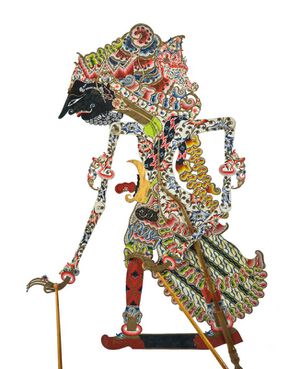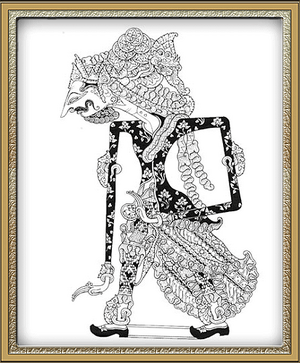Abiyasa - (Wayang Kulit)
| Title | Abiyasa - (Begawan) - Mahabharata |
|---|---|
| Other names | Byasa, Wyasa, Dewayana, Kresnadipayana (young), Saktinaprawa, Rencakaprawa, Subyasa, Wijana |
| Size | 50 cm |
| Personal data | Abiyasa is the son of Begawan Palasara, king of Astina in the era before Pendawa, and Dewi Satyawati. He is the grandfather of the Pandavas and Kauravas. Abiyasa was the King of Astinapura until his children inherited it from him, when they were old enough to rule the kingdom. His three children were Destarastra (blind), Pandhu Dewanata, and Yama Widura. Destarastra was the father of the hundred Korawa brothers, Pandhu Dewanata was the father of the five Pandhawa brothers, and Yama Widura was the father of prince Sunjaya. |
| Appearance | Abiyasa has a wise, just and compassionate character. Begawan Abyasa was Prabu Kresnadipayana after he became a priest. He started with a chain to the back, wearing a garuda on his back, wearing a kluwih flower, wearing a shirt, scarf and shoes. It is also clothed in priest's robes. Prabu Kresnadipayana has wide eyes, a pointed nose, and a beard. Crowned and decorated with three tiers with eagles on their backs. Dressed up in royal robes and shoes. |
| Collection | Private collection |
Abiyasa – (Begawan) – Mahabharata
It is said that Resi Palasara was standing on the banks of the Yamuna River asking to be taken across by boat. Satyawati approached him and took him to the other side by boat. During their conversation, Satyawati told him that she had a disease that caused her body to smell bad. Satyawati's father advised that any man who could cure her disease could be her husband.
Resi Palasara, who was indeed captivated by Satyawati's beauty, was willing to cure Satyawati's disease. Palasara was able to cure Satyawati's disease in an instant.
After the proposal was approved by Satyawati's parents, Parasara held a wedding. They then enjoyed their first night on an island in the middle of the Yamuna River. There Parasara created a thick dark fog so that the island could not be seen by others. From their relationship, an extraordinary child was born, the child was named Krishna Dwaipayana, because his skin was black (Krishna) and was born in the middle of the island (Dwaipayana). Krishna Dwaipayana grew up quickly and followed in his father's footsteps as a sage.
His mother, Satyawati left him since childhood, she then married the king of the Hastinapura kingdom, Prabu Santanu. From that marriage, they were blessed with two sons, namely Citranggada and Wicitrawirya. Citranggada died in a battle, while Wicitrawirya died of illness. The two Kuru princes died without having children who would later continue the throne of Hastinapura, because Santanu's son, Bhishma had sworn that he would not be the heir to the throne of Hastinapura and would never marry according to his promise to Satyawati's father when he proposed to Satyawati for his father. Therefore, Satyawati called Byasa to perform a yajna (sacred ceremony) to obtain offspring. The two widows of Wichitravirya, Ambika and Ambalika, were asked to appear before Byasa alone to be given the ceremony.
Ambika was the first to appear before Byasa, she was afraid to see Byasa's face, so she closed her eyes. Then Byasa said that Ambika's child would be born blind.
Then Ambalika appeared before Byasa, but previously Satyawati had reminded Ambalika not to close her eyes, so that her child would not be born blind. Ambalika did not close her eyes, but when she looked at Byasa's face, she became afraid and her face turned pale. Byasa said that Ambalika's child would look pale.
Ambika's child who was born blind was Dhritarashtra, the father of the Kauravas, while the child born to Ambalika who had a pale face was Pandu, the father of the Pandavas. Because both children were not physically healthy, Satyawati asked Byasa to perform the ceremony once again. But Ambika and Ambalika did not want to face Byasa anymore, they ordered a maid to represent them. The maid was calm during the ceremony, and the child she gave birth to was named Vidura.
Byasa also helped Gendari and Dhritarashtra who were desperate to have the baby that Gendari was carrying but had not yet been born. Meanwhile, Kunti had given birth to Pandu. Full of annoyance and jealousy, Gendari beat her womb, and the fetus she was carrying was born. However, what was born was not a cute little baby but a lump of grayish flesh. Byasa then cut the flesh into a hundred pieces, then each piece was put into a jug/jar and planted in the ground. A year later, the jug was taken back and babies emerged from the hundred jugs. Dhritarashtra's son was later known as Dhritarashtra's son.
Prabu Abyasa King who is wise, fair and loving to his people. He always adheres to the customs of the king. Abyasa then became a priest king, meaning a king who became a priest, titled Begawan Abyasa and lived in Mount Retawu or Saptarengga. When he was on the throne, he was called Prabu Kresnadipayana. Abyasa became the advisor, teacher and guardian of Pandhawa brothers. He had a very long life until his death during the rule of King Parikesit (his great-great grand son).
Before muksa (death in the sense of disappearing with his gross body), Begawan Abyasa went around accompanied by the Pendawa family and their descendants outside the city (country) and with a sense of excitement surveyed the area where the Baratayuda war had taken place.
Where a place is found damaged by war, the place is repaired. Where souls are found that have not yet died, he perfects the death of those souls by worshiping. And when Sang Begawan found out that Reverend Durna's soul had not died completely, he ordered the Pendawa to complete it, because Reverend Durna was also the teacher of the Pendawa. The hearts of the priests were moved by this event. They saw how great the consequences of the Baratayuda War were.
Byasa was not involved in the great war in Kurukhsetra. But he knew in detail how the situation was on the battlefield, because he lived in a forest in the Kurukhsetra region, very close to the location of the Bharatayuddha war. After the war was over, Ashwatama took refuge in Abiyasa's dormitory. Not long after, Arjuna and the Pandavas followed. In Abiyasa's dormitory, Arjuna and Ashwatama fought, both of them took out their sacred weapons. Abiyasa then broke them up, he asked them to draw their weapons, Arjuna succeeded in doing so, but Ashwatama did not, so he was given the option to direct his weapon at another object. Ashwatama directed his weapon at the womb of Utara, Abhimanyu's wife, until the baby she was carrying died. However, with the help of Krishna, the baby could be revived, the baby was Parikshit who became the successor to the Kuru kingdom.
Sang Begawan reached an advanced age and was able to witness the birth of his great-grandchild Raden Parikesit.
Raden Parikesit used the name Kresnadipayana after he was enthroned as king in Astina, as is the custom of the Javanese, when someone replaces his father's rank. There is another Javanese custom of taking part of the father's name after someone gets married. For example, after Susanto, Prawirakusuma's son, got married, he chose or chose for him the name Prawiraraharja as his maiden name.
According to the puppet show, Abiyasa moksa after Parikesit, Abimanyu's son, was 35 days old. To get the blessing of his great-grandfather, during the selapanan ceremony Parikesit was held by Abiyasa, who had come to the Astina Palace from the Wukirahtawu Hermitage in Sapta Arga.br
A few moments after holding his great-grandfather, Abiyasa felt that his death had arrived, but he did not want to go to heaven if he was not accompanied by his body. The gods granted his request and sent a light chariot to pick him up. Abiyasa's moksa was witnessed by the entire Pandawa family, Prabu Kresna and Prabu Baladewa.
Meanwhile, according to the Adiwangsawatarana Parwa, which is part of the Mahabarata, Abiyasa moksa during the reign of Prabu Janamejaya, Parikesit's grandson. The moksa event also took place at the Astina Palace.
The original Mahabarata book is Begawan Abiyasa's masterpiece as a literary poet. The book, which is then considered one of the Holy Books for followers of Hinduism, consists of 18 parvas and more than 7,000 verses. In writing this great work, Abiyasa was assisted by Batara Ganesa, a god with an elephant head, and is known as the god of science and literary arts.
Source: History of Wayang Purwa - Hardjowirogo - PN Balai Pustaka - 1982
Blog: Hadisukirno – Yogyakarta – 2012


